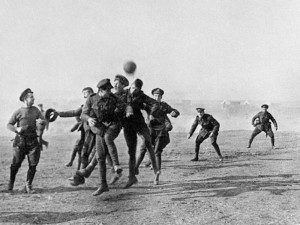Spirit of Christmas
Christmas is in danger of becoming disconnected from the Christian story altogether. There’s a ‘spirit of Christmas’ that’s invoked in such things as the new Christmas TV advertisement from Sainsburys that tells the moving story of the 1914 ‘Christmas Truce’ between British and German soldiers in the trenches (including the famous, almost mythological, game of football) but such is the power of such stories that the need for the original Christian story is greatly reduced.
 Peace at Christmas? Remember the First World War, when common humanity broke out against the call of national loyalty. Who needs a star over a stable? Sharing at Christmas? Buy a chocolate bar like the one that was given by a British soldier to his German counterpart. Who needs Wise Men bearing gifts? Joy at Christmas? You can see it on the faces of those young men enjoying their football, courtesy of a huge production budget and some fine acting. Who needs the glow of a baby in his mother’s arms?
Peace at Christmas? Remember the First World War, when common humanity broke out against the call of national loyalty. Who needs a star over a stable? Sharing at Christmas? Buy a chocolate bar like the one that was given by a British soldier to his German counterpart. Who needs Wise Men bearing gifts? Joy at Christmas? You can see it on the faces of those young men enjoying their football, courtesy of a huge production budget and some fine acting. Who needs the glow of a baby in his mother’s arms?
It’s been happening for years, of course. Disney and Hollywood characters line up alongside angels and shepherds among the children’s toy displays. Christmas family films usually centre on some kind of encounter with – or version of – Father Christmas. The Christian roots of such things are well enough known, but if you get your inspiration from cuddly penguins or schmaltzy elves, where does Jesus fit in?
Well, as has been pointed out often enough, Christmas as an annual midwinter celebration was never Christian in its origins, but pagan. Only once the Christian church became ‘mainstream’ did the Christian story become attached to the festival of Saturnalia. It’s interesting to speculate as to what Christians did during the earlier period when it came to celebrating the birth of the baby Jesus.
But that was then, this is now, as they say. No self-respecting Christian church in the 21st century would contemplate not celebrating the birth of Christ, though angst continues annually as to the relationship between the Bible story and the world’s festivities. And for all that it is worth pointing out that there was no ‘bleak midwinter’ in 1st century Palestine and no reindeer, holly or ivy either, there are plenty of links in the Bible with the kind of world in which, today, we celebrate; light shining in the darkness, for instance.
Perhaps what this means for us, is that we must continue to tell the Christian story of the birth of Christ (along with the rest of the story) sincerely, joyfully and honestly, not allowing it to descend into just one more among many fairy stories on offer at this time of year, nor letting creative ways of telling it cause confusion among those for whom the original story is hardly known.
After all, the basic, underyling idea, that God has come into this world in the unlikely form of a baby born to poor parents in the backwater of a bureaucratic and uncaring empire in a part of the world that still weeps and wails, witnessed by some ne’er do-well shepherds and some travelling astrologers, is one that continues to resonate in today’s world. The spirit of Christmas is more than just warm feelings (‘sharing and caring’); it is God’s Spirit and it offers hope to a hurting world.
Michael Docker


